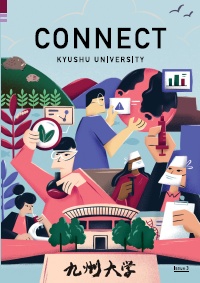
Issue-based and cross-disciplinary education at Kyushu U
Programs at the School of Interdisciplinary Science and Innovation lead the way
Founded in 2018, the School of Interdisciplinary Science and Innovation (ISI) is a bilingual undergraduate program offering a Bachelor’s degree in the arts and sciences (BASc) at Kyushu University. The program spearheads issue-based, cross-disciplinary efforts at the university. At the ISI, students work on relevant societal issues ranging from climate change and cybersecurity to pandemics. They then address these complex problems by integrating perspectives and coming up with action proposals to bring about social change.
Johan Lauwereyns, Kyushu University’s Vice President of International Affairs and Vice Dean of the ISI, talks about the School’s hallmarks.
Q Who are you training?
We train three groups of people: skilled civil servants, entrepreneurs, and innovative researchers. We develop people who can design and organize projects as well as analyze concepts and problems. We nurture people who can lead teams and facilitate social change.
These people might end up working in local or global governments, or become managers in large international organizations. We are also developing graduates to be innovative researchers with a cross-disciplinary perspective to social issues.
Our liberal arts-like approach gives students at least two years to find their interests. Four years down the road, they might turn to a field like oceanography and focus on an interdisciplinary research topic such as microplastic pollution.
Q What is your School’s teaching philosophy?
Collaboration among people with different kinds of expertise and backgrounds. That is why we emphasize our international outlook. We want to be flexible in our school’s medium of communication. In their first year, Japanese students receive intensive English training, while international students learn Japanese.
Q What is the ISI’s unique style of teaching?
Our hallmark is Collaborative Courses, oriented towards teamwork and problem solving. Here, students work in small groups, draw on instructor-provided materials, gather information, and analyze data to come up with feasible projects for positive impact.
Our current style of teaching, Issue-based, Collaborative Online International Learning (Issue-based COIL), is an unexpected gain resulting from COVID-19 restrictions. The pandemic caused our hallmark Collaborative Courses to go online, and this allowed us to connect with students worldwide.
The pandemic caused our hallmark Collaborative Courses to go online, and this allowed us to connect with students worldwide.
Q What are Issue-based COIL courses particularly good for?
The first in a series of Issue-based COIL courses I teach is on bioethics and bioengineering, in collaboration with King Mongkut’s University of Technology Thonburi (KMUTT) in Thailand. We get KMUTT bioengineering students to work on action proposals together with our ISI students.
Another Issue-based COIL course in preparation is about the Holocaust, in collaboration with The Holocaust Museum-Yad Vashem in Israel and the University of Macau. Virtually putting students from such different backgrounds in one classroom and making them reflect on World War II is not an easy endeavor. By discussing the Holocaust, we hope that the students can find a common ground to address these atrocities.
Issue-based COIL makes these collaborations possible and comes with many advantages. Through it, the university can forge new collaborations with overseas institutions; teachers can make connections with researchers from around the world; and finally, students can gain a foretaste of studying abroad.
This article first appeared in issue 3 of Connect, Kyushu University's English-language magazine. View other articles online, download a PDF (4.5 MB) of the full issue, or browse previous issues to learn about more exciting things happening at Kyushu U.
































